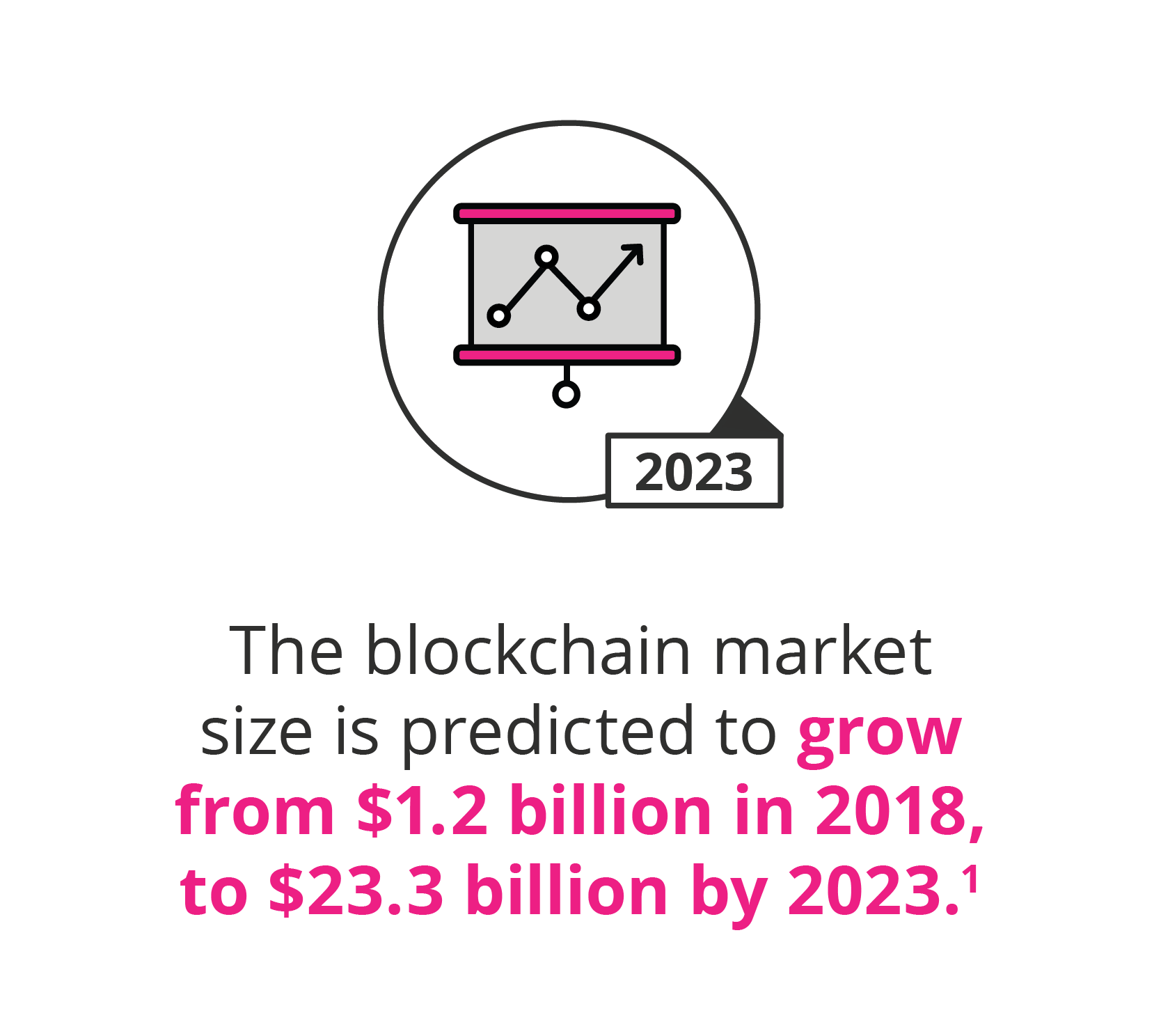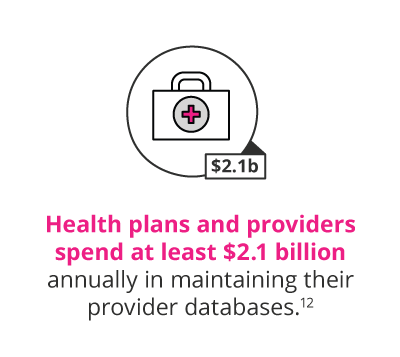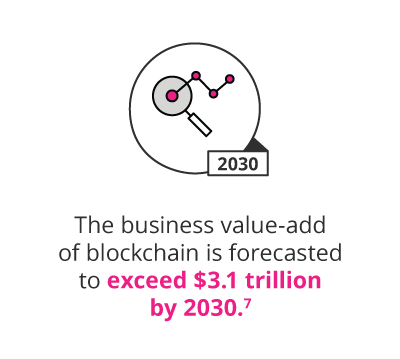Industries and Careers In Blockchain
The blockchain market size is predicted to grow from $1.2 billion in 2018, to $23.3 billion by 2023.1 Businesses are identifying the need to simplify, innovate, and scale, and by nature, blockchain aims to do all three. Fueled by the financial services industry, blockchain is growing from strength to strength, and industry to industry. In the latest skills index conducted by Upwork, blockchain has been listed as the fastest-growing skill, out of 5,000 listed on the site.2 As the industry grows, so will the appeal in blockchain careers.
Currently, the demand is far outpacing the supply,3 however, this is set to change. Blockchain is progressing beyond its cryptocurrency sibling, and diverse industries are harnessing the power of its secure, distributed ledger technology.

The progression to blockchain
Blockchain technology is still considered to be in its infancy,4 but businesses and traditional institutions aren’t ignoring its potential.
According to a study from SAP SE, the most important attributes of enterprise blockchain, and why it’s featuring within organisations, are:5
- The transparency it offers in the overall value chain.
- It’s a trustworthy source of shared data.
- Industry standardisation.
The digital revolution has facilitated architecture suited for technological connection and shared ecosystems, and blockchain is the perfect mirror of this. Organisations no longer operate in siloed ventures; platforms are created and technology is supporting the move away from compartmentalised technical systems. Blockchain’s basic premise of a decentralised database can be used in disparate, global industries. Its allure also lies in the fact that a central authority is no longer needed – transactions are easily facilitated, and secure.6

The industries impacted by blockchain
The business value-add of blockchain is forecasted to exceed $3.1 trillion by 2030,7 and the industries blockchain has disrupted are exponentially expanding. As a greater understanding of its implications and technological influence is achieved, so these industries are increasingly affected:
- Banking and finance
Blockchain and bitcoin are two terms often used in conjunction with one another. Blockchain’s digital ledger is the platform from which cryptocurrencies operate.8 As the two technologies are so intertwined, it’s natural that the finance market would be one of the foremost industries that blockchain has the potential to revolutionise. The banking industry would greatly benefit from blockchain’s decentralised system. Blockchain has the ability to store massive amounts of data securely, and facilitate money transfers more efficiently and cost effectively. Data and transactions would run minimal risk of cyber attacks, experience9 - Politics
Any voting system manages a large amount of data that is recorded, tracked, and finally analysed. Despite the authentication processes that voting often facilitates, tampering of votes is a major concern and reality. Blockchain could accurately store, count, and track votes – eliminating recount scenarios or fraud.10 Votes would be captured as transactions within the chain, and a verifiable, transparent audit trail would be available. - Energy
Blockchain could transform the green energy market through the use of smart grid networks. Transactive Grid is doing just this in Brooklyn, New York. Developed by LO3 Energy – a technology firm that focuses on distributed energy initiatives, consensus systems and blockchain development, the project works by trading energy among neighbours.11 Energy, or as they’ve now developed and termed, Exergy – is generated, stored, bought, sold and used locally amongst individuals. - Healthcare
The healthcare system’s biggest challenge lies in the need for an accessible yet safe digital system where doctors and medical professionals can easily and securely access records. An analysis done by the Council for Affordable Quality Healthcare, Inc., (CAQH) revealed that commercial health plans and providers spend at least $2.1 billion annually in maintaining their provider databases.12 Blockchain presents the potential for health records to be stored and moved from birth to death, despite the change in doctor, medical aid, or location.13 Records can be accessed immediately, saving time in critical situations. - Real estate
The property market is a congested space of paperwork, processes, potential fraud, records, and time. Blockchain offers digital smart contracts, efficiency in transactions, and security.14 Transfer titles, property deeds and other necessary documentation can be stored, and accurately verified. - Transportation
Blockchain has the potential to work with the Internet of Things in enabling smart cities. Street signs, traffic lights, cars and even other static objects could collect and send data, captured through embedded sensors, to a system that would react and reroute traffic. The result would be less city congestion, faster commutes and possibly lower carbon emissions.15 Parking could also easily be found, traffic tickets could be managed and paid, and any crashes or maintenance issues would be recognised and handled.
Insurance, education, cloud computing, storage, and even the entertainment business can all benefit from blockchain’s technology. Some industries will develop and adapt quicker than others, but the potential for its application is vast. Growth within blockchain isn’t where the challenge lies, but rather the rate of professionals gaining expertise with this developing technology.

Careers in blockchain
Blockchain’s global adoption depends on the technical skills of developers, and the strategic leadership abilities of professionals navigating business solutions.16 Just as the list of potential markets increases, so do blockchain technology jobs:
- Blockchain development is considered one of the most robust blockchain careers to venture into. Though the technology has peaked interest from most industries leaders, until actual solutions are created within blockchain, the benefits can’t be fully utilised and implemented within business processes.
- A blockchain designer is different to the above developer or engineer in the fact that designers focus on user interfaces. As the technology expands across a diverse array of industries, the actual design of blockchain solutions will become more prominent.17
- Strategy and project management will also become integral positions as businesses cohesively link their internal operations to their specific needs and objectives.18
Blockchain standardisation is the ultimate goal, as then true, open collaboration can take place across huge networks. Transparency will also occur across traditional, business and private sectors. Innovators are still scratching the surface of its potential, but significant transformation may be on the horizon.
- 1 (Dec, 2018). ‘The global blockchain market size…’. Retrieved from PR Newswire.
- 2 (2018). ‘Upwork releases Q1 2018 skills index…’ Retrieved from Upwork.
- 3 Marr, B. (Jul, 2018). ‘Here are 10 industries blockchain is likely to disrupt’. Retrieved from Forbes.
- 4 Al-Heeti, A. (Apr, 2018). ‘Health care groups to use blockchain to improve provider data’. Retrieved from CNET.
- 5 Perez, G. (Apr, 2018). ‘Blockchain: a study rooted in reality’. Retrieved from SAP.
- 6 Marr, B. (Jul, 2018). ‘Here are 10 industries blockchain is likely to disrupt’. Retrieved from Forbes.
- 7 (Mar, 2017). ‘Forecast: blockchain business value, worldwide, 2017-2030’. Retrieved from Gartner.
- 8 Marr, B. (Jul, 2018). ‘Here are 10 industries blockchain is likely to disrupt’. Retrieved from Forbes.
- 9 Marr, B. (Jul, 2018). ‘Here are 10 industries blockchain is likely to disrupt’. Retrieved from Forbes.
- 10 (Dec, 2018). ‘Banking is only the beginning: 50 big industries blockchain could transform’. Retrieved from CB Insights.
- 11 (Feb, 2019). Retrieved from LO3 Energy.
- 12 (Nd). ‘Defining the Provider Data Dilemma’. Retrieved from CAQH.
- 13 Marr, B. (Jul, 2018). ‘Here are 10 industries blockchain is likely to disrupt’. Retrieved from Forbes.
- 14 (Dec, 2018). ‘Banking is only the beginning: 50 big industries blockchain could transform’. Retrieved from CB Insights.
- 15 Johnson, C. (Jun, 2018). ‘4 industries likely to be disrupted by blockchain’. Retrieved from Entrepreneur.
- 16 Marr, B. (Jul, 2018). ‘Here are 10 industries blockchain is likely to disrupt’. Retrieved from Forbes.
- 17 Marr, B. (Jul, 2018). ‘Here are 10 industries blockchain is likely to disrupt’. Retrieved from Forbes.
- 18 Marr, B. (Jul, 2018). ‘Here are 10 industries blockchain is likely to disrupt’. Retrieved from Forbes.
